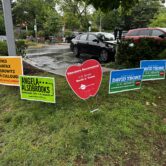LOS ANGELES (CN) — Gregory Jacob, Mike Pence's legal counsel during the Trump presidency, testified Wednesday before the California State Bar about attorney John Eastman's influence in the days leading up to Jan. 6, 2021.
The State Bar began hearing Tuesday to determine if attorney John Eastman should be disbarred for his role in a plan crafting the legal theory that Vice President Pence could have overturned the 2020 election results.
In February 2022, the former Donald Trump lawyer withheld hundreds of emails subpoenaed by the House Select Committee to investigate the Jan. 6 attack on the U.S. Capitol — claiming attorney-client privilege. Eastman’s two memos, laying out a strategy for denying and reversing the results of the election, became key.
In January, the State Bar filed 11 disciplinary charges against Eastman and sought to strip him of his license to practice law.
Eastman testified in person Tuesday before California Bar Court Judge Yvette Roland, repeating claims that he thought reports from analysts claiming the 2020 election was invalid were reliable. He said he believes the election was invalid, and admitted to working with Rudy Giuliani’s team in December 2020.
State Bar attorney Duncan Carling interrupted Eastman’s testimony Wednesday, to bring in witness and attorney Gregory Jacob. Jacob was Pence’s legal counsel while Pence was vice president, and worked to refute Eastman’s theory that the vice president held unilateral authority to reject states' electors.

Jacob said that by early January 2021, he had thoroughly researched how to handle the 2020 election results, under The Electoral Count Act. The act governs the way that electoral votes are cast and counted during presidential elections, and precludes any constitutional powers the vice president might have around certifying the electoral count.
The attorney said he and Pence concluded that neither the vice president nor Trump had the authority to contest or delay election results.
“It was always his view that it did not make any constitutional sense to him that the framers of our Constitution would vest authority to reject electors in one individual,” Jacob said of Pence, who himself has been a lawyer.
He recounted meetings with Eastman, with Trump present, the week of Jan. 6, where Eastman suggested that Pence let states finish investigating the electoral results. He wrote to Pence that Eastman’s theory was “unworkable” and concluded that Congress and the vice president cannot reject electors. The next day Eastman advised Pence to reject electors, and Jacob saw Trump tweeting that Pence did have the power to “win the presidency.”
“No vice president in the entire history of our country has ever asserted that they had the authority that Dr. Eastman was now asserting that Pence should assert that he, as vice president, had,” Jacob said. “What we had here was a sentence in the Constitution that is ambiguous, in the sense that it does not say anything about rejecting electors at all.”

Recounting the insurrectionists' Capitol invasion on Jan. 6, Jacob discussed an email he sent to Eastman while locked down with Pence in a secure location. He told Eastman that his legal theories were "entirely made up" and concluded: "And thanks to your bullshit, we are now under siege."
Jacob said he thinks people who marched on the Capitol seemed to think Pence had the ability to reject electors, or suspend the count and send it back to the states.
Carling used as evidence an op-ed that Jacob began writing while hiding from rioters on Jan. 6, that he chose not to get published in The Washington Post. In that article he said that while lawyers can have different viewpoints, they have to give competent advice sufficient to make professional decisions.
Jacob said he decided not to run the column because if Eastman was representing Trump during the week of Jan. 6, then meetings could be subject to executive privilege considerations.
Asked why he wrote it, Jacob said he thought Eastman’s using unfounded theories from law articles, to advise the president, “brought our profession into disrepute.”
“I was offended for my profession," he said.
In cross-examination, Miller asked Jacob about the process researching the act, and why he did not find any evidence of fraud affecting the election outcome.
He repeatedly asked Jacob if he thought that there are constitutional issues with the act. Jacob said that legal review articles raised questions about the act, but he decided most of the act is constitutional.
Miller asked Jacob if he knew Trump was exercising his right to a redress for grievances against the government, by having Eastman represent him in meetings about the election, as a presidential candidate — not as president.
“Eastman never indicated that’s what he was doing,” Jacob said.
The State Bar's hearing on this case is set through June 30.
Subscribe to Closing Arguments
Sign up for new weekly newsletter Closing Arguments to get the latest about ongoing trials, major litigation and hot cases and rulings in courthouses around the U.S. and the world.









